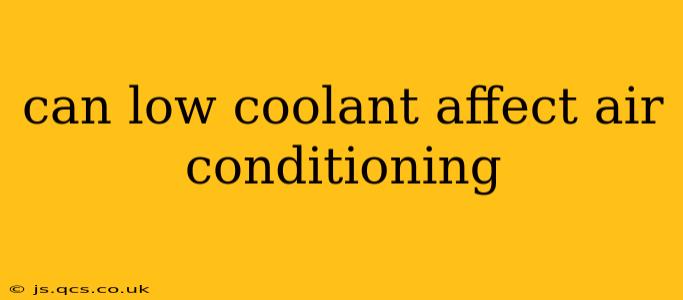Low coolant levels in your car's engine cooling system might seem unrelated to your air conditioning, but there's a surprising connection. While they operate independently, a lack of sufficient coolant can indirectly impact your AC's performance, sometimes significantly. This article explores this relationship, answering common questions and offering valuable insights.
How are the Cooling System and AC System Related?
The engine cooling system and the air conditioning system share a crucial component: the engine's power. The AC compressor, the heart of your air conditioning system, is driven by the engine. If your engine is overheating due to low coolant, it can lead to problems with the compressor and, consequently, your air conditioning.
Can Low Coolant Directly Affect AC Performance?
No, low coolant doesn't directly affect the refrigerant levels or the operational mechanics of your AC system. The two systems use different fluids and have distinct functions. However, the indirect effects can be substantial.
H2: What Happens When the Engine Overheats Due to Low Coolant?
When the engine coolant is low, the engine can overheat. This overheating stresses numerous components, including the AC compressor. High temperatures can damage the compressor's seals, bearings, and other internal components, causing it to fail or operate inefficiently. This leads to:
- Reduced cooling power: Your AC might blow warm or lukewarm air instead of cool air.
- Compressor seizing: In extreme cases, the compressor can seize entirely, rendering your AC completely inoperable.
- Increased wear and tear: Even if the compressor doesn't fail immediately, prolonged overheating accelerates its wear and tear, shortening its lifespan.
- System leaks: Overheating can cause pressure fluctuations within the system, potentially leading to leaks in the AC lines or compressor.
H2: Will Adding Coolant Fix My AC?
Adding coolant will only address the overheating issue, not a faulty AC compressor. If the problem is already present within the compressor due to overheating, adding coolant might prevent further damage but won't restore the compressor to full functionality. It's crucial to address any AC-related problems separately through a proper diagnosis and repair by a qualified mechanic.
H2: Other Reasons Why My AC Isn't Working
It's important to remember that low coolant is just one potential cause of AC malfunction. Several other issues could be at play, including:
- Low refrigerant: This is a common AC problem that requires refrigerant recharge.
- Faulty compressor clutch: The clutch engages and disengages the compressor. A faulty clutch prevents the compressor from operating.
- Electrical problems: Issues with the wiring, fuses, or relays can disable the AC system.
- Leaking refrigerant lines: Small leaks can gradually deplete refrigerant, reducing the cooling capacity.
- Condenser issues: A clogged or damaged condenser reduces the efficiency of the cooling process.
H2: How to Prevent AC Problems Related to Low Coolant
Regularly check your engine coolant level. This simple maintenance task can prevent many problems, including damage to your air conditioning system. Look for leaks, and promptly address any coolant loss. Keep your vehicle properly maintained, and get your cooling system and AC system checked during routine maintenance.
Conclusion: While low coolant doesn't directly affect your AC, the resultant engine overheating can severely damage the AC compressor. Regular coolant checks and prompt attention to any cooling system issues are crucial to prevent costly AC repairs down the line. Always consult a qualified mechanic for diagnosis and repair of both your cooling and air conditioning systems.
